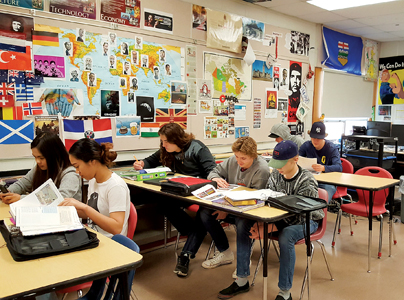Current Temperature
16.2°C
Student Vote planting roots of democracy
Posted on April 24, 2019 by Taber Times TIMES FILE PHOTO
TIMES FILE PHOTOSeveral local schools across the Taber and Vauxhall areas participated in the Student Vote initiative for Alberta’s provincial election in 2019.
Coinciding with government elections, students learn about government and the electoral process, research the parties and platforms, discuss relevant issues and cast ballots for the official election candidates. The results are shared with the media for broadcast and publication following the closing of the official polls.
The program is open to all schools and there is no cost to participate. Registered schools are supplied with print and online pedagogical materials, posters and election supplies. The activities are intended to inform students about government and the electoral process, encourage research into the candidates and issues, and foster dialogue among students and their families.
Kids were also given the online tool of the Vote Compass which is a tool developed by political scientists that calculates ones views compared with those of Alberta’s political parties. To say participating kids in the Taber, Barnwell, Vauxhall, Enchant and Grassy Lake regions were engaged would be an understatement.
The Cardston-Siksika riding which encompasses the Vauxhall region, voted in United Conservative Party’s Joe Schow, and had 25 returning schools casting a total of 1,720 votes. The-Taber-Warner riding had the Student Vote having UCP candidate Grant Hunter rise to power, with 26 returning schools casting a total of 2,483 votes.
In Taber, a student forum was held in which all the candidates participated and drew a standing-room only crowd with a packed floor and bleachers at Central School. A Social Studies class who had students who were 18 years old had casting your official legal vote as part of a field trip. Testimonials by teachers from some schools who participated, admitted the exploration of the subject matter got pretty spirited at times, showing kids were taking great interest in the subject matter at hand.
Although none of the votes officially count towards who gets into political office, it is still a very worthwhile initiative in getting youth engaged in the political process and it looks like it’s working. Numbers have shown a dismal turnout for young people at the polls historically, but recently, that tide is turning. There were 58.3 per cent of newly eligible voters who turned out to vote in 2015 — an increase of 17.7 points over 2011. The 2015 federal election saw a huge increase in turnout among young Canadians — particularly young Canadian women — according to data released by Elections Canada. With the numbers trickling in for 2019, the number of voters who cast their vote in the younger demographics looks to be just as solid. Unofficial voter turnout is 71.1 per cent based on 1,880,508 votes cast and 2,643,453 registered electors.
Initiatives like Student Vote can only aid in overall voter turnout as kids get ready to enter adulthood. There is the fear that kids are simply being told by their parents how to vote, but there is also the possibility that kids are passing on information they are researching in class on how various parties stand on various issues that the parent may not have been aware of in their busy lives, making sure there is food on the table for the family unit. Soaking in as much information as you can about the political process is never a bad thing and can be a win-win for adults and kids alike.
And it would be in the current UCP majority’s best interest to pay attention to the results and not simply sluff off the voice of youth even though their vote did not officially count.
Both adults and kids alike were in favour of an United Conservative Party majority, although the Student Vote netted a stronger opposition for the New Democratic Party.
Last Tuesday night’s provincial election netted 63 seats for the United Conservative and 24 for the NDP. No other party managed to garner a seat, including Alberta Party and Liberal being shutout.
In the Student Vote results, the UCP won a majority government with 49 seats. The NDP formed the opposition with 35 seats. The Alberta Party won three seats. In the Student Vote percentages, numbers were even tighter, with the UCP getting 36.02 per cent of the overall vote compared to NDP receiving 30.35 per cent. Alberta Party got 18.46 per cent.
While not having an official say in this past week’s provincial election, there are still all sorts of issues that affect youth, be it the economy their parents work in, minimum wage for their own part-time jobs, vaccinations in schools, Gay-Straight Alliances, education and health care funding. The issues are vast that affect youth as well.
Youth have decades upon decades of voting in front of them and if the issues that were raised during Student Vote 2019 are ignored, when kids turn into their early 20s when the next election rolls around, they may not have short memories.
Any political party looking to stay in power for the long-haul need to not only look at the present — but the future as well.
Leave a Reply
You must be logged in to post a comment.

